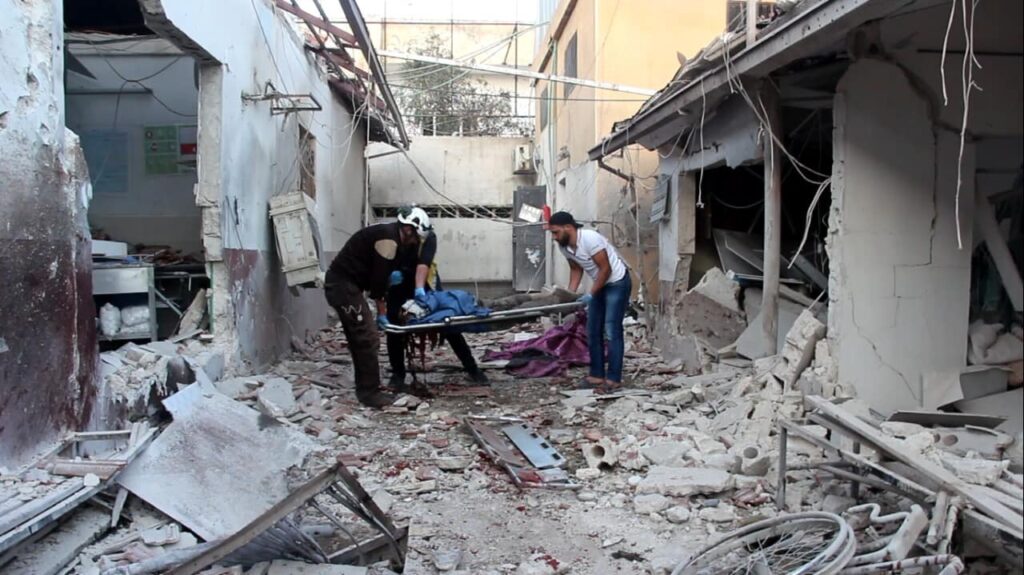Updates & Press
Blog Featured | August 18, 2021
World Humanitarian Day: Humanitarians Are #NotATar
Author | MedGlobalComms

By Valerie Nguyen, MedGlobal Policy Intern
In May, the world saw as bombings killed and injured hundreds of people living in Gaza, including critical local medical providers and humanitarians. Dr. Ayman Abu al-Ouf, the head of internal medicine at Al-Shifa hospital, was one of them. He was killed in the early morning on May 16 from a missile attack in the al-Wedha district along with eight of his family members. This missile attack killed 33 civilians in total, leaving first responders searching through the rubble of destroyed apartments for survivors.
Dr. Ayman Abu al-Ouf was considered one of the most senior internal medical doctors in Gaza. His death was an extreme loss not only for the medical community but also for the Gaza Strip in general. Gaza faces an extreme shortage of medical professionals after ongoing acute conflict and more than a decade of blockade.
A second doctor was also killed during this 11 day bombardment on Gaza: Dr. Mooein Ahmad al-Aloul, who was a 66-year old neurologist killed in his home from missile attacks in the al-Wehda district of Gaza. Dr. al-Aloul studied in Egypt and France before returning to Gaza to work in a specialized clinic. The loss of each medical personnel has an exponential effect on the community as a whole and Gaza’s fragile medical system.
World Humanitarian Day was created in 2009 by the United Nations General Assembly in memory of the bomb attack on the Canal Hotel in Baghdad, Iraq on August 19, 2003 which killed 22 people. On World Humanitarian Day and every day, it is critical to recognize the contributions of local humanitarians, remember the friends and colleagues our community has lost, and advocate for the safety and security of humanitarians globally. According to the Aid Worker Security Database, 475 humanitarian aid workers were killed in 2020 – a high death toll that continued despite restrictions set by the global pandemic. The past two years recorded the highest number of attacks and injuries inflicted on humanitarians.
Health workers in particular have faced unique dangers. The coalition Safeguarding Health in Conflict, of which MedGlobal is on the Steering Committee, documented 806 incidents of attacks against or obstruction of health care in 43 countries and territories in 2020 alone. In Syria, attacks against health care have been a center point of the conflict. Recently, artillery strikes hit the Al-Atareb hospital killing 7 patients and injuring 15 people, including five medical staff. This latest attack is one of 600 hospital attacks that Physicians for Human Rights has recorded over the 10 year conflict in Syria.
Throughout this past year and throughout history, humanitarian workers have risked their lives serving on the front lines to offer medical, emergency, and critical services to the most vulnerable who are critically in need. Local humanitarians have been instrumental in providing necessary services and care for communities living in remote or conflict areas. Responding to dire crises in the midst of the global pandemic has left local humanitarians even more at risk due to COVID-19. A recent UN Council Security meeting focused on the escalating trend of targeting humanitarian workers. “Humanitarian aid is being used as a bargaining chip, and we see this materializing in many, many conflicts in all regions of the planet,” said Robert Mardini, the Director General of the International Red Cross.
This World Humanitarian Day, MedGlobal honors local humanitarians around the world who are essential leaders in responding to the most extreme crises in their own communities and serving people in the most challenging settings. We particularly want to honor those who have lost their lives serving others, and reiterate that attacks on humanitarians and health personnel are dire violations of international humanitarian and human rights law. Humanitarians are not a target, and governments and international stakeholders must work together to reverse this illegal and inhumane trend.


